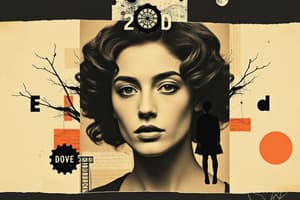Podcast
Questions and Answers
Fiction stories are based entirely on factual events.
Fiction stories are based entirely on factual events.
False (B)
Non-fiction literature aims to entertain rather than educate.
Non-fiction literature aims to entertain rather than educate.
False (B)
Drama is a form of literature that is performed to bring stories to life.
Drama is a form of literature that is performed to bring stories to life.
True (A)
The setting of a story refers to its emotional tone and thematic depth.
The setting of a story refers to its emotional tone and thematic depth.
Characters in a story can include animals and objects, not just humans.
Characters in a story can include animals and objects, not just humans.
The theme of a literary work is usually straightforward and easily interpreted.
The theme of a literary work is usually straightforward and easily interpreted.
The plot of a story is defined as the emotional experiences of the characters.
The plot of a story is defined as the emotional experiences of the characters.
Poetry utilizes language in creative and condensed forms to evoke emotions.
Poetry utilizes language in creative and condensed forms to evoke emotions.
All genres of literature share the same elements such as plot, characters, setting, and theme.
All genres of literature share the same elements such as plot, characters, setting, and theme.
Flashcards are hidden until you start studying
Study Notes
Types of Literature
- Fiction: Stories born from the author's imagination; may be inspired by real events but are not factual.
- Non-Fiction: Focuses on factual information and real-world events; aims to educate and inform on various subjects.
- Drama: A performance art form that brings narratives to life through actors, allowing audiences to engage with the characters and story dynamically.
- Poetry: Utilizes condensed language creatively to evoke emotions, paint imagery, and tell stories succinctly.
Elements of Literature
- Plot: The structured sequence of events in a story, typically featuring a beginning, middle, and end, driven by a central conflict.
- Characters: Individuals (including animals or objects) within the story, developed through their actions, dialogue, thoughts, and interactions.
- Setting: The specific time and place of the narrative, which greatly influences the plot, characterization, and mood.
- Theme: The central message or idea conveyed by the author, explored through elements like plot, characters, and setting, and often open to interpretation.
Studying That Suits You
Use AI to generate personalized quizzes and flashcards to suit your learning preferences.




